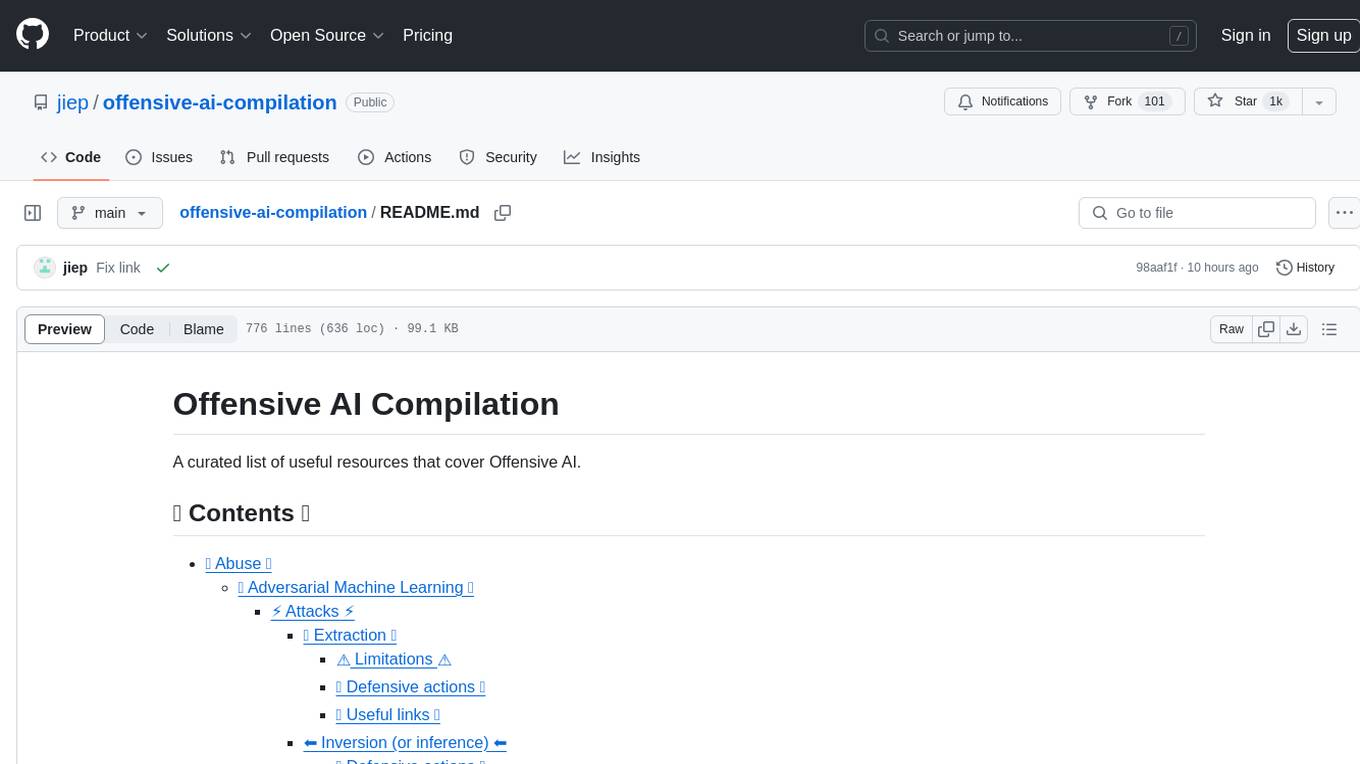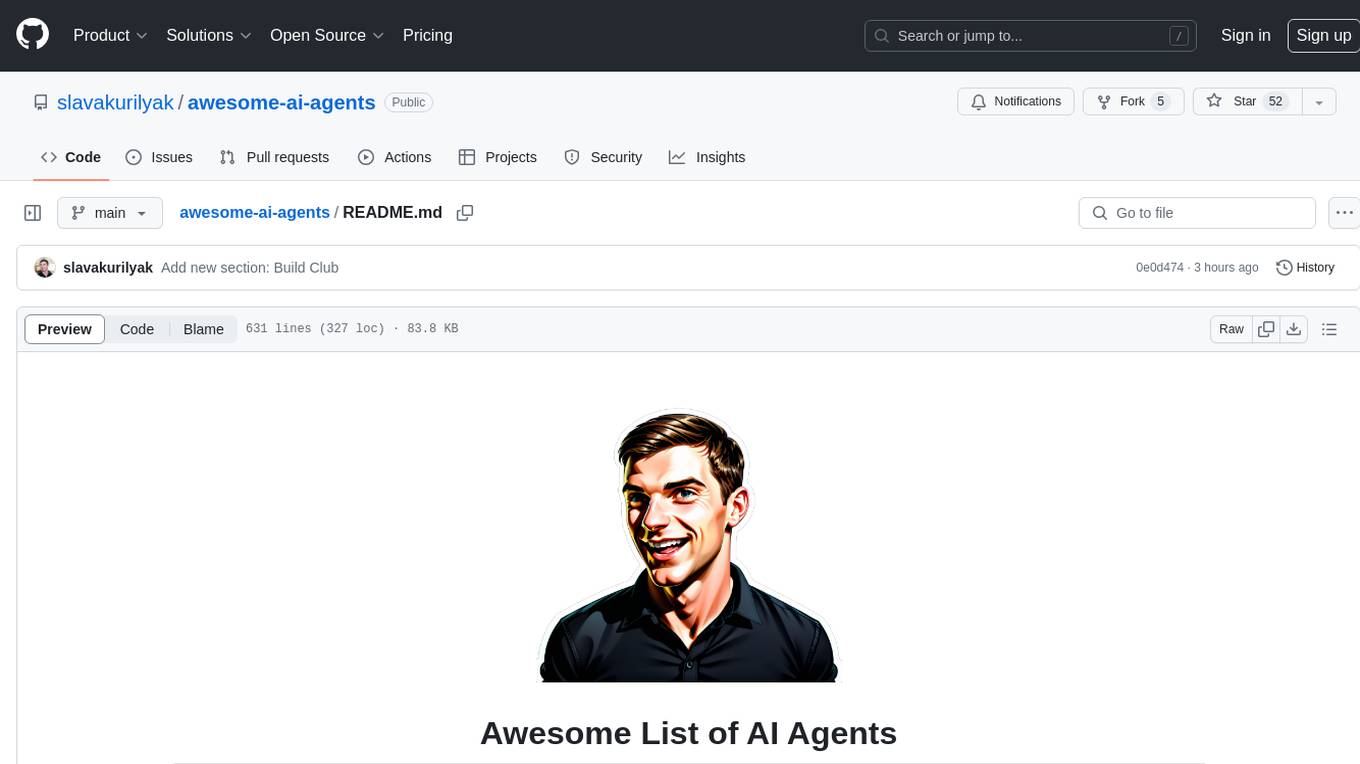
awesome-agents
🤖 Awesome list of AI Agents
Stars: 177
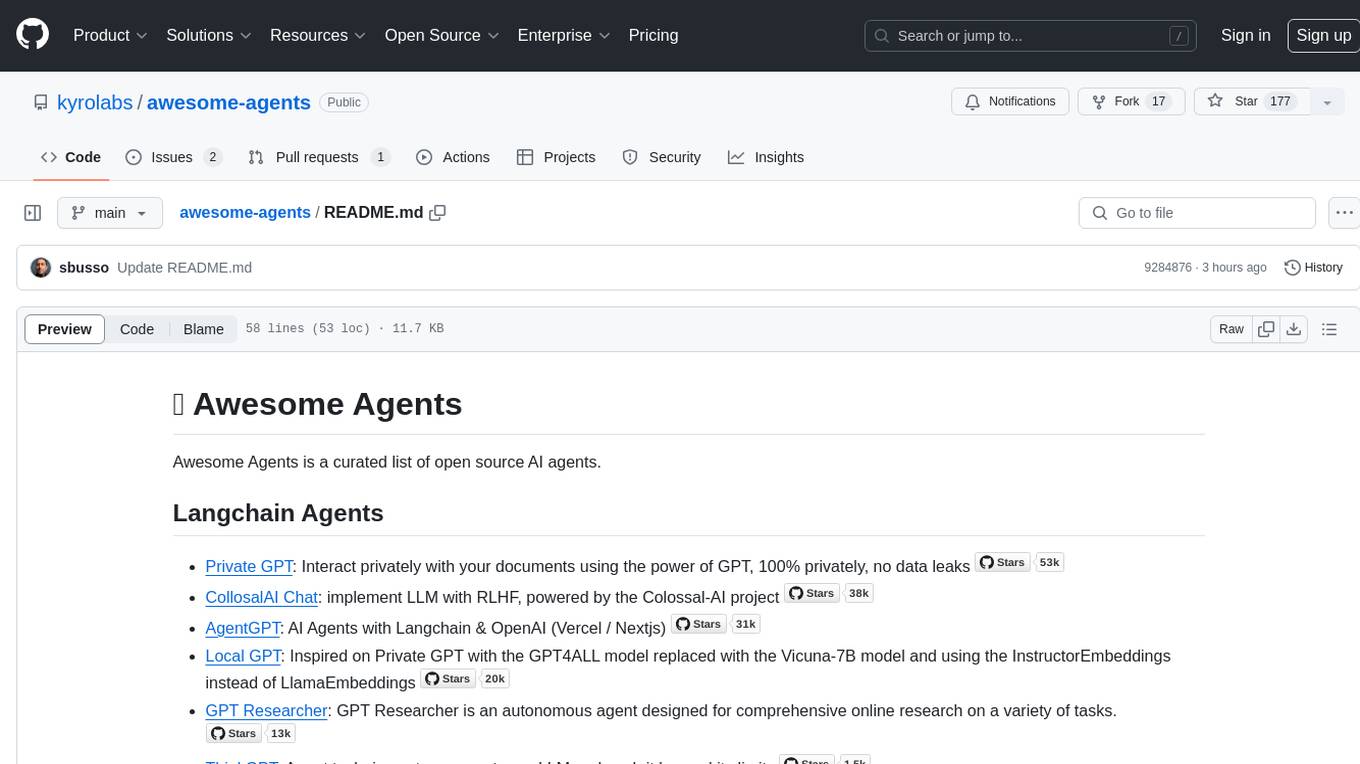
Awesome Agents is a curated list of open source AI agents designed for various tasks such as private interactions with documents, chat implementations, autonomous research, human-behavior simulation, code generation, HR queries, domain-specific research, and more. The agents leverage Large Language Models (LLMs) and other generative AI technologies to provide solutions for complex tasks and projects. The repository includes a diverse range of agents for different use cases, from conversational chatbots to AI coding engines, and from autonomous HR assistants to vision task solvers.
README:
Awesome Agents is a curated list of open source AI agents.
-
Private GPT: Interact privately with your documents using the power of GPT, 100% privately, no data leaks
-
CollosalAI Chat: implement LLM with RLHF, powered by the Colossal-AI project
-
AgentGPT: AI Agents with Langchain & OpenAI (Vercel / Nextjs)
-
Local GPT: Inspired on Private GPT with the GPT4ALL model replaced with the Vicuna-7B model and using the InstructorEmbeddings instead of LlamaEmbeddings
-
GPT Researcher: GPT Researcher is an autonomous agent designed for comprehensive online research on a variety of tasks.
-
ThinkGPT: Agent techniques to augment your LLM and push it beyond its limits
-
Camel-AutoGPT: role-playing approach for LLMs and auto-agents like BabyAGI & AutoGPT
-
RasaGPT: RasaGPT is the first headless LLM chatbot platform built on top of Rasa and Langchain.
-
SkyAGI: Emerging human-behavior simulation capability in LLM agents
-
PyCodeAGI: A small AGI experiment to generate a Python app given what app the user wants to build
-
BabyAGI UI: Make it easier to run and develop with babyagi in a web app, like a ChatGPT
-
SuperAgent: Deploy LLM Agents to production
-
Voyager: An Open-Ended Embodied Agent with Large Language Models
-
ix: Autonomous GPT-4 agent platform
-
DuetGPT: A conversational semi-autonomous developer assistant, AI pair programming without the copypasta.
-
Multi-Modal LangChain agents in Production: Deploy LangChain Agents and connect them to Telegram
-
DemoGPT: DemoGPT enables you to create quick demos by just using prompt. It applies ToT approach on Langchain documentation tree.
-
SuperAGI: SuperAGI - A dev-first open source autonomous AI agent framework
-
Autonomous HR Chatbot: An autonomous agent that can answer HR related queries autonomously using the tools it has on hand
-
BlockAGI: BlockAGI conducts iterative, domain-specific research, and outputs detailed narrative reports to showcase its findings
-
waggledance.ai: An opinionated, concurrent system of AI Agents. It implements Plan-Validate-Solve with data and tools for general goal-solving.
-
Elasticsearch Agent: ElasticSearch agent based on ElasticSearch, LangChain and GPT 4
-
LLocalSearch: LLocalSearch is a completely locally running search aggregator using LLM Agents. The user can ask a question and the system will use a chain of LLMs to find the answer. The user can see the progress of the agents and the final answer. No OpenAI or Google API keys are needed.
-
Plandex: An AI coding engine for complex tasks
-
Codel: ✨ Fully autonomous AI Agent that can perform complicated tasks and projects using terminal, browser, and editor.
-
DB GPT: Interact your data and environment using the local GPT, no data leaks, 100% privately, 100% security
-
RestGPT: An LLM-based autonomous agent controlling real-world applications via RESTful APIs
-
Second Brain AI Agent: A streamlit app to dialog with your second brain notes using OpenAI and ChromaDB locally.
-
Autonomous HR Chatbot An autonomous HR agent that can answer user queries using tools
-
XAgent: An Autonomous LLM Agent for Complex Task Solving
-
LLM Agents: Build agents which are controlled by LLMs
-
SuperAGI: A dev-first open source autonomous AI agent framework.
-
RestGPT: An LLM-based autonomous agent controlling real-world applications via RESTful APIs
-
OpenAgents: An Open Platform for Language Agents in the Wild
-
Agency: 🕵️♂️ Library designed for developers eager to explore the potential of Large Language Models (LLMs) and other generative AI through a clean, effective, and Go-idiomatic approach
-
TaskWeaver: A code-first agent framework for seamlessly planning and executing data analytics tasks.
-
MicroAgent: Agents Capable of Self-Editing Their Prompts / Python Code
-
uAgents: A fast and lightweight framework for creating decentralized agents with ease.
-
Maestro: A framework for Claude Opus to intelligently orchestrate subagents.
-
GPT Pilot: GPT Pilot is the core technology for the Pythagora VS Code extension that aims to provide the first real AI developer companion.
-
SWE Agent: SWE-agent takes a GitHub issue and tries to automatically fix it, using GPT-4, or your LM of choice.
-
AgentRun: The easiest, and fastest way to run AI-generated Python code safely
-
LLama Cpp Agent: The llama-cpp-agent framework is a tool designed for easy interaction with Large Language Models
-
data-to-paper: data-to-paper: AI-driven research from data to human-verifiable research papers
-
Pipecat: Open Source framework for voice and multimodal conversational AI.
-
Phidata: Build AI Assistants with memory, knowledge and tools.
-
Vision agent: Vision Agent is a library that helps you utilize agent frameworks to generate code to solve your vision task.
-
llama-agents: llama-agents is an async-first framework for building, iterating, and productionizing multi-agent systems, including multi-agent communication, distributed tool execution, human-in-the-loop, and more
- Claude Engineer: Claude Engineer is an interactive command-line interface (CLI) that leverages the power of Anthropic's Claude-3.5-Sonnet model to assist with software development tasks.
For Tasks:
Click tags to check more tools for each tasksFor Jobs:
Alternative AI tools for awesome-agents
Similar Open Source Tools

awesome-agents
Awesome Agents is a curated list of open source AI agents designed for various tasks such as private interactions with documents, chat implementations, autonomous research, human-behavior simulation, code generation, HR queries, domain-specific research, and more. The agents leverage Large Language Models (LLMs) and other generative AI technologies to provide solutions for complex tasks and projects. The repository includes a diverse range of agents for different use cases, from conversational chatbots to AI coding engines, and from autonomous HR assistants to vision task solvers.
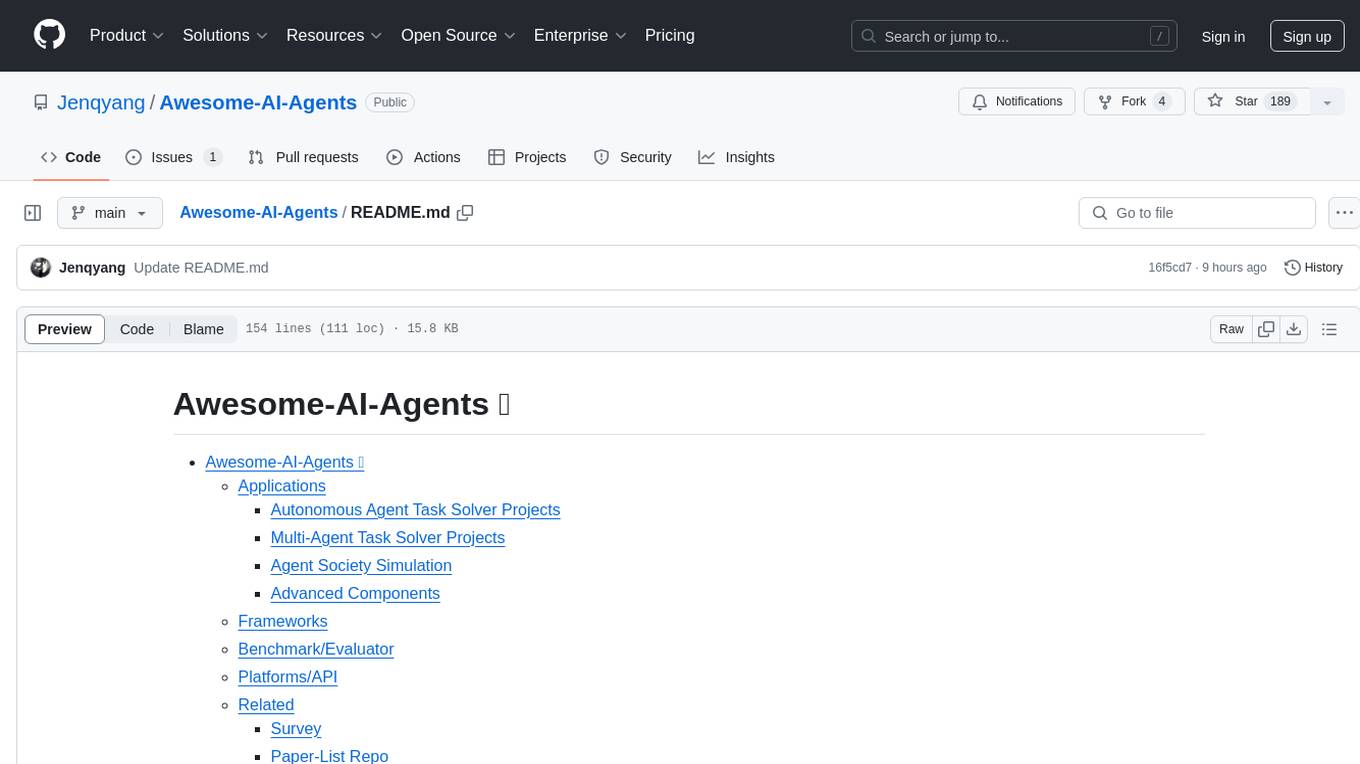
Awesome-AI-Agents
Awesome-AI-Agents is a curated list of projects, frameworks, benchmarks, platforms, and related resources focused on autonomous AI agents powered by Large Language Models (LLMs). The repository showcases a wide range of applications, multi-agent task solver projects, agent society simulations, and advanced components for building and customizing AI agents. It also includes frameworks for orchestrating role-playing, evaluating LLM-as-Agent performance, and connecting LLMs with real-world applications through platforms and APIs. Additionally, the repository features surveys, paper lists, and blogs related to LLM-based autonomous agents, making it a valuable resource for researchers, developers, and enthusiasts in the field of AI.
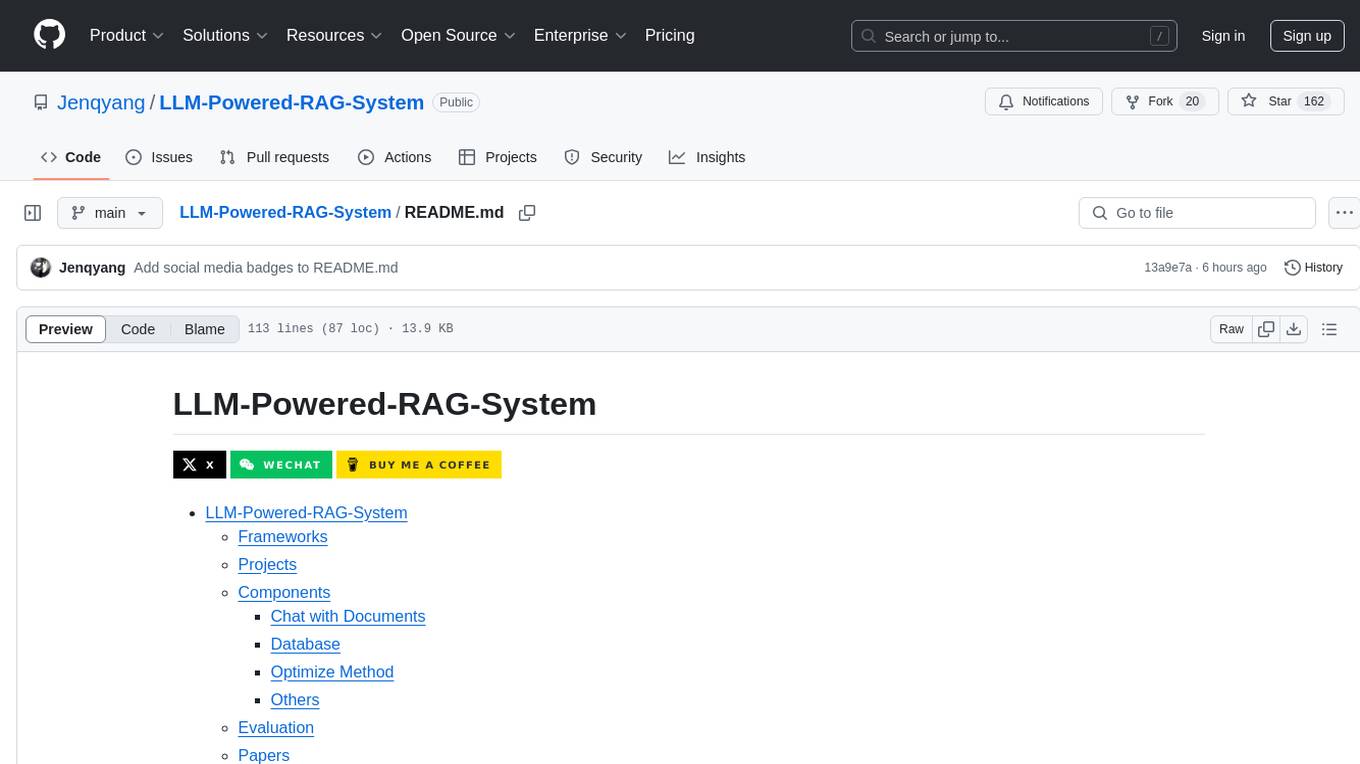
LLM-Powered-RAG-System
LLM-Powered-RAG-System is a comprehensive repository containing frameworks, projects, components, evaluation tools, papers, blogs, and other resources related to Retrieval-Augmented Generation (RAG) systems powered by Large Language Models (LLMs). The repository includes various frameworks for building applications with LLMs, data frameworks, modular graph-based RAG systems, dense retrieval models, and efficient retrieval augmentation and generation frameworks. It also features projects such as personal productivity assistants, knowledge-based platforms, chatbots, question and answer systems, and code assistants. Additionally, the repository provides components for interacting with documents, databases, and optimization methods using ML and LLM technologies. Evaluation frameworks, papers, blogs, and other resources related to RAG systems are also included.
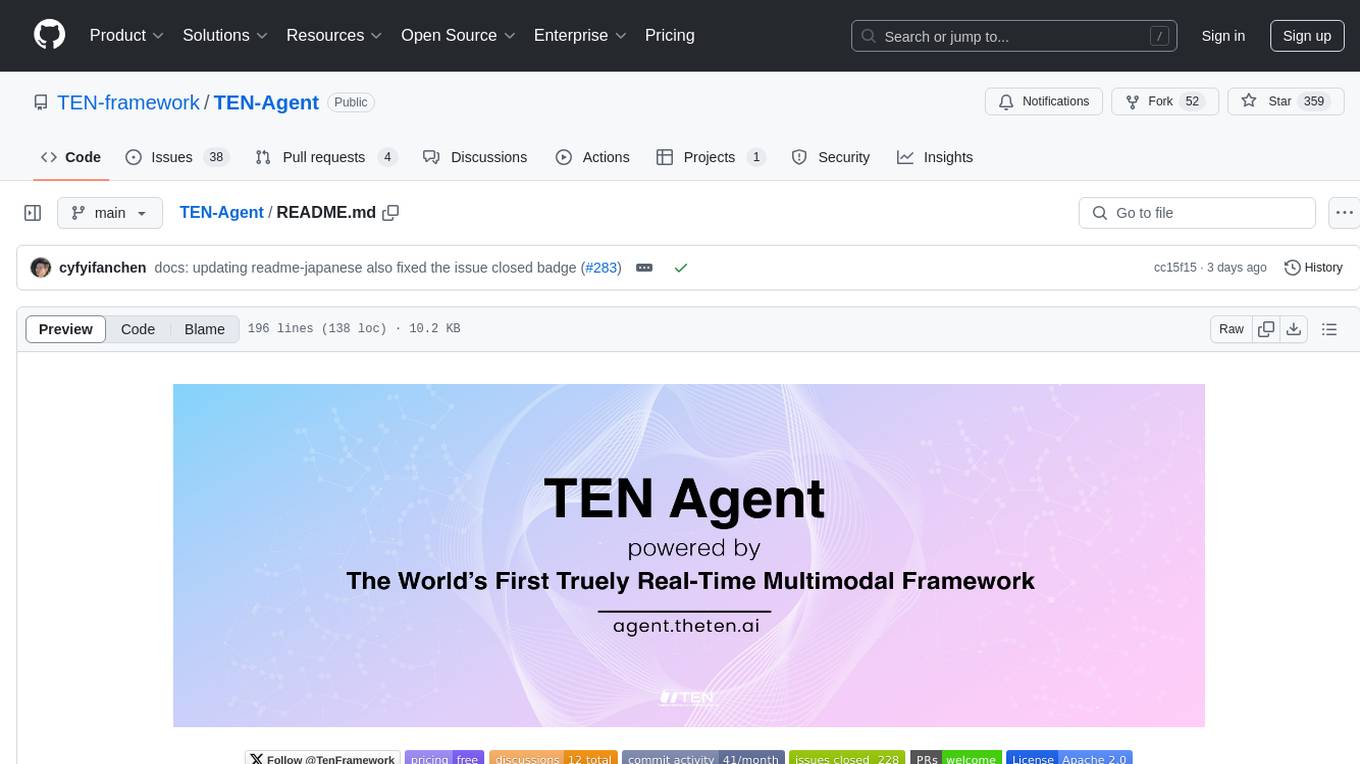
TEN-Agent
TEN Agent is an open-source multimodal agent powered by the world’s first real-time multimodal framework, TEN Framework. It offers high-performance real-time multimodal interactions, multi-language and multi-platform support, edge-cloud integration, flexibility beyond model limitations, and real-time agent state management. Users can easily build complex AI applications through drag-and-drop programming, integrating audio-visual tools, databases, RAG, and more.

autogen
AutoGen is a framework that enables the development of LLM applications using multiple agents that can converse with each other to solve tasks. AutoGen agents are customizable, conversable, and seamlessly allow human participation. They can operate in various modes that employ combinations of LLMs, human inputs, and tools.
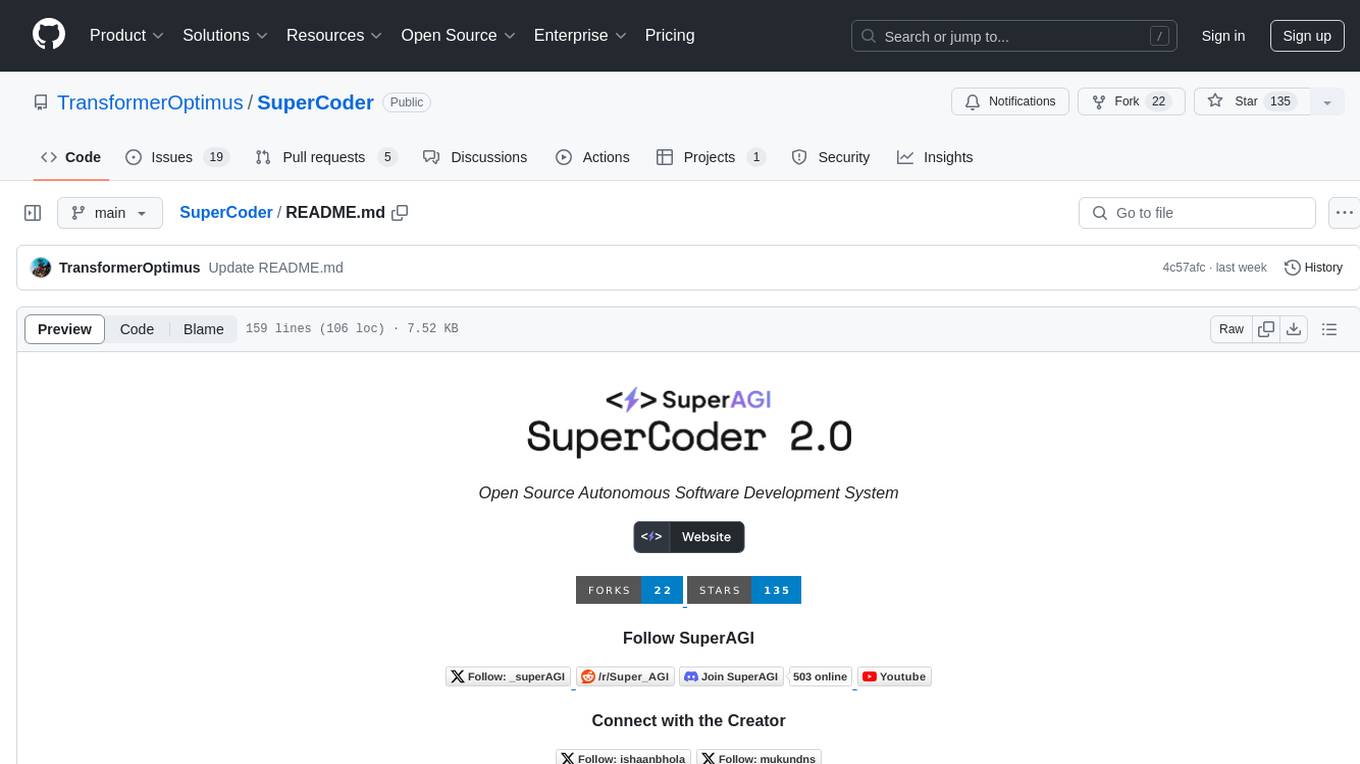
SuperCoder
SuperCoder is an open-source autonomous software development system that leverages advanced AI tools and agents to streamline and automate coding, testing, and deployment tasks, enhancing efficiency and reliability. It supports a variety of languages and frameworks for diverse development needs. Users can set up the environment variables, build and run the Go server, Asynq worker, and Postgres using Docker and Docker Compose. The project is under active development and may still have issues, but users can seek help and support from the Discord community or by creating new issues on GitHub.
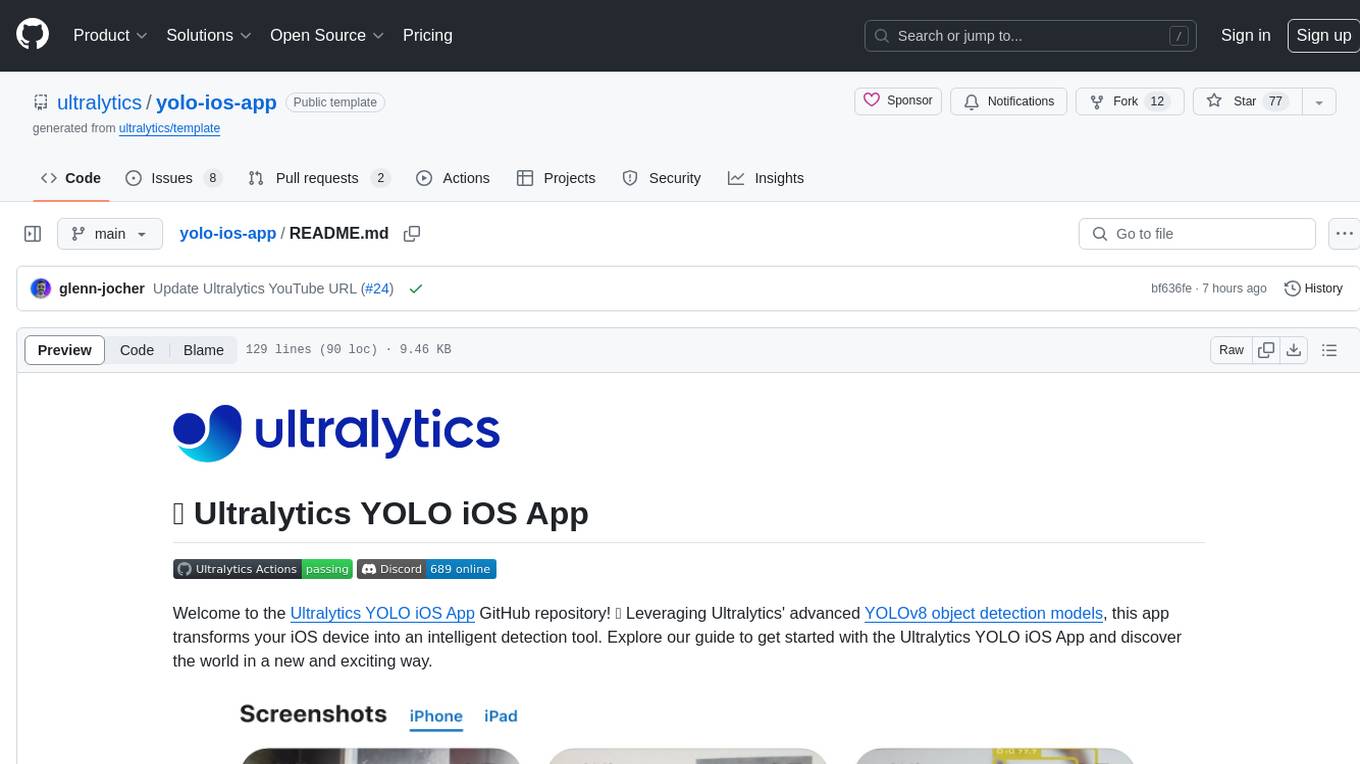
yolo-ios-app
The Ultralytics YOLO iOS App GitHub repository offers an advanced object detection tool leveraging YOLOv8 models for iOS devices. Users can transform their devices into intelligent detection tools to explore the world in a new and exciting way. The app provides real-time detection capabilities with multiple AI models to choose from, ranging from 'nano' to 'x-large'. Contributors are welcome to participate in this open-source project, and licensing options include AGPL-3.0 for open-source use and an Enterprise License for commercial integration. Users can easily set up the app by following the provided steps, including cloning the repository, adding YOLOv8 models, and running the app on their iOS devices.
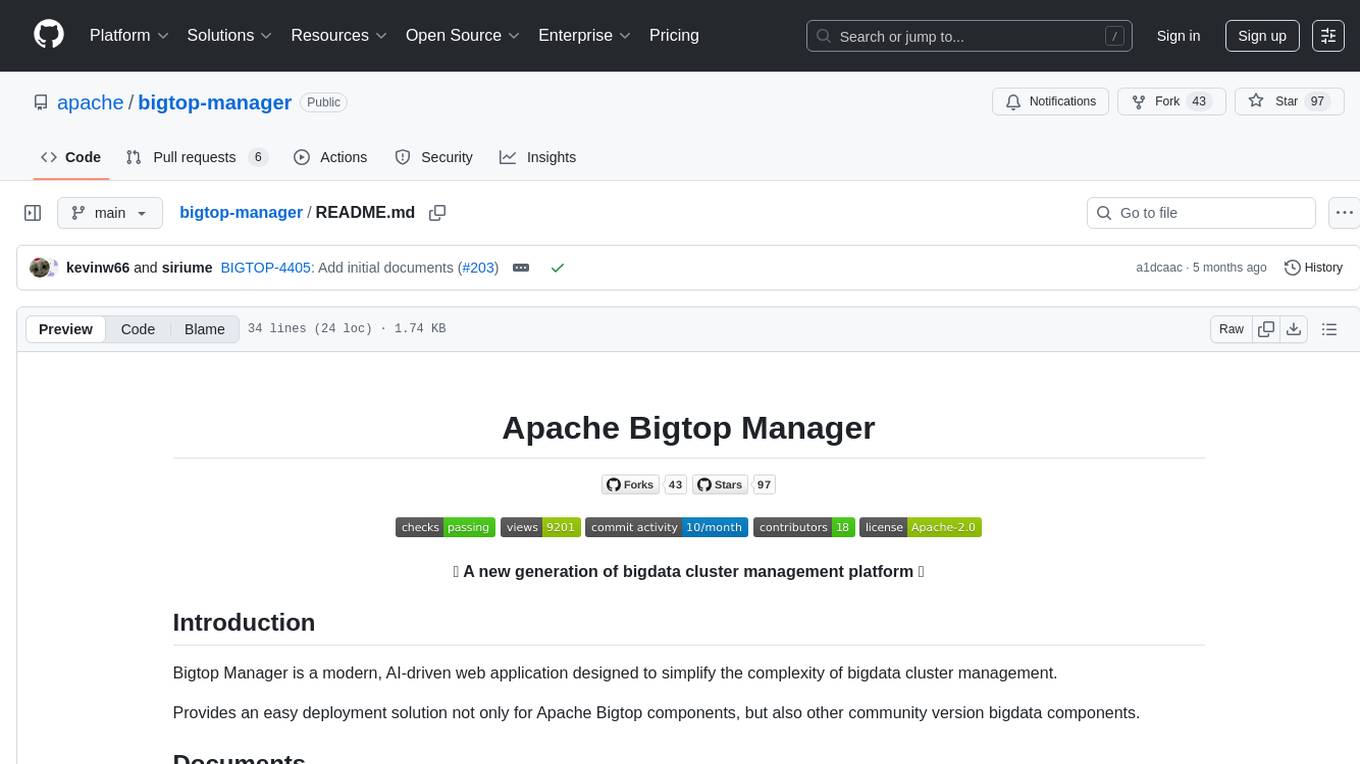
bigtop-manager
Apache Bigtop Manager is a modern, AI-driven web application designed to simplify the complexity of bigdata cluster management. It provides an easy deployment solution not only for Apache Bigtop components, but also other community version bigdata components. The platform aims to streamline the management of bigdata clusters by leveraging AI technology and user-friendly interfaces.

tidb
TiDB is an open-source distributed SQL database that supports Hybrid Transactional and Analytical Processing (HTAP) workloads. It is MySQL compatible and features horizontal scalability, strong consistency, and high availability.
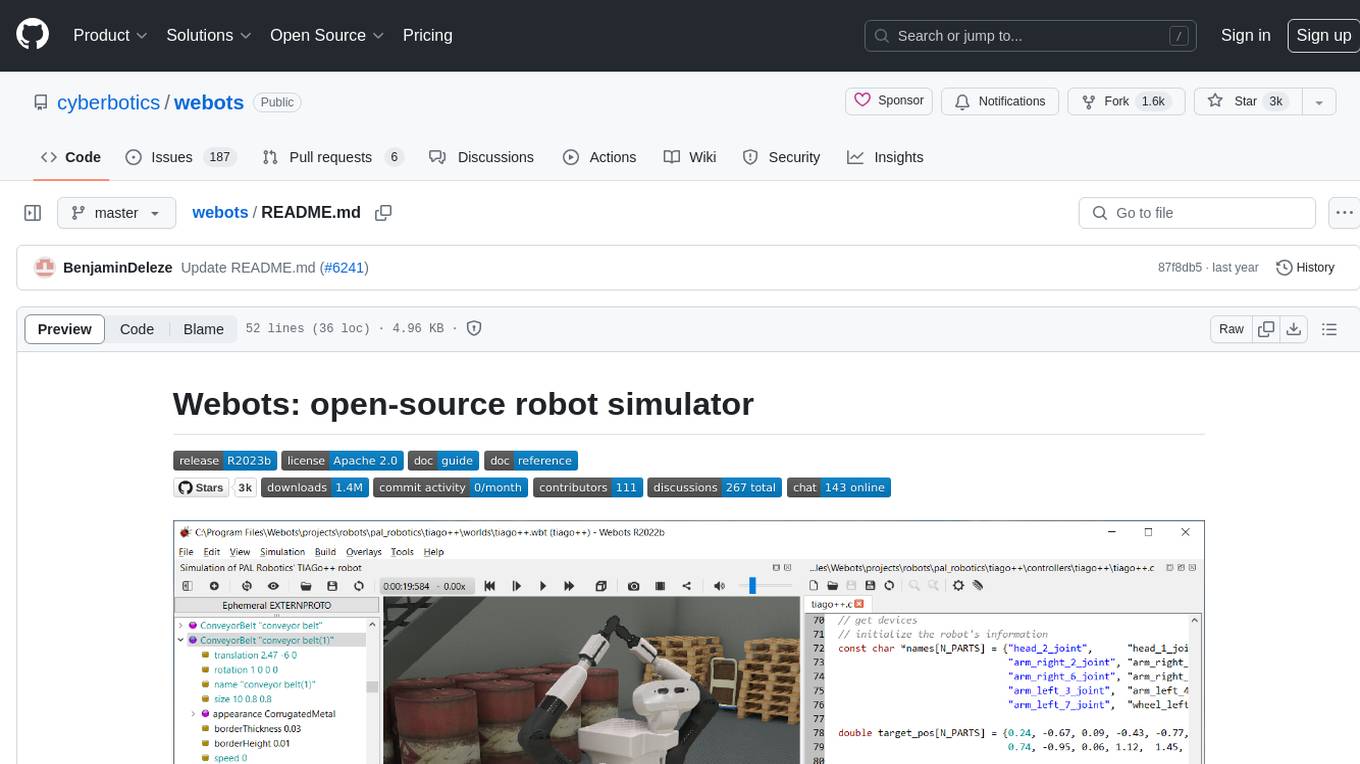
webots
Webots is an open-source robot simulator that provides a complete development environment to model, program, and simulate robots, vehicles, and mechanical systems. It was originally designed at EPFL in 1996 and further developed and commercialized by Cyberbotics since 1998. Webots was open-sourced in December 2018 and continues to be developed by Cyberbotics with paid customer support, training, and consulting services for industry and academic research projects.
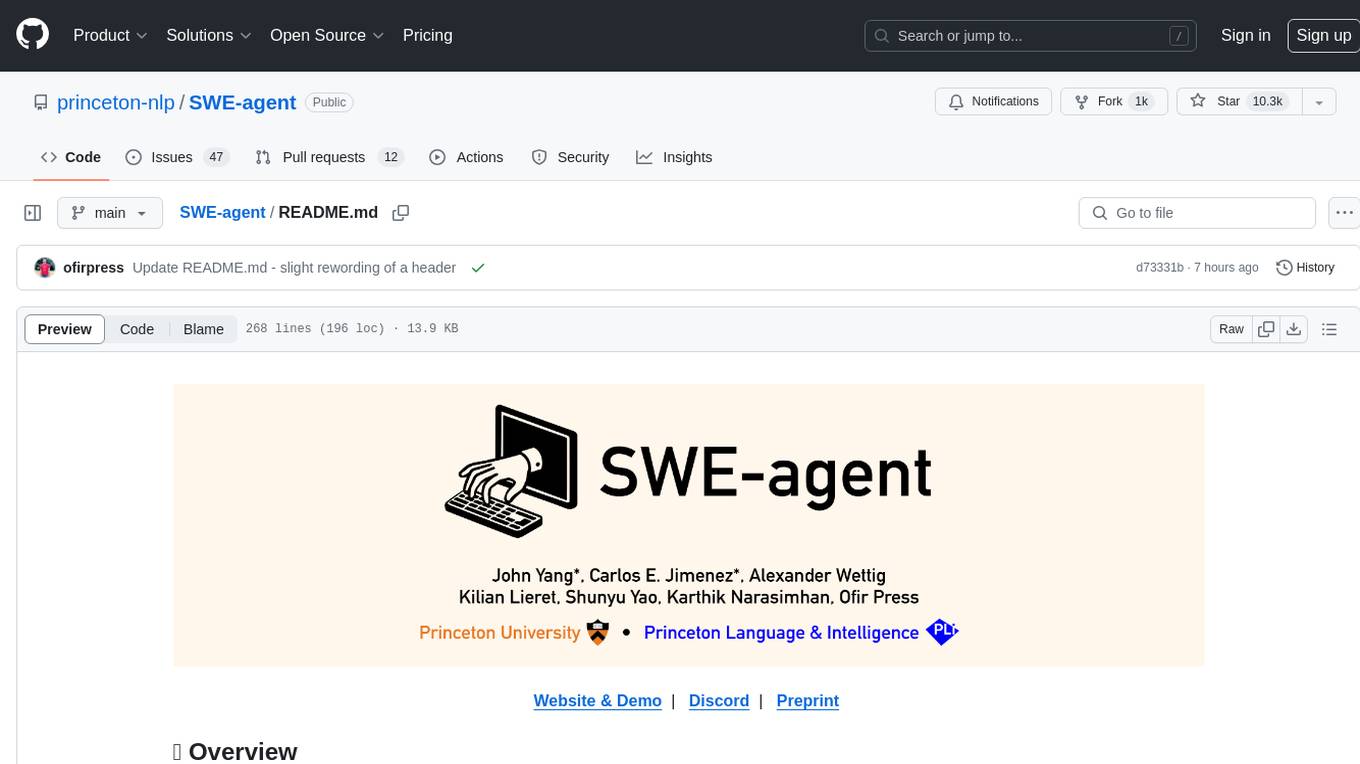
SWE-agent
SWE-agent is a tool that turns language models (e.g. GPT-4) into software engineering agents capable of fixing bugs and issues in real GitHub repositories. It achieves state-of-the-art performance on the full test set by resolving 12.29% of issues. The tool is built and maintained by researchers from Princeton University. SWE-agent provides a command line tool and a graphical web interface for developers to interact with. It introduces an Agent-Computer Interface (ACI) to facilitate browsing, viewing, editing, and executing code files within repositories. The tool includes features such as a linter for syntax checking, a specialized file viewer, and a full-directory string searching command to enhance the agent's capabilities. SWE-agent aims to improve prompt engineering and ACI design to enhance the performance of language models in software engineering tasks.
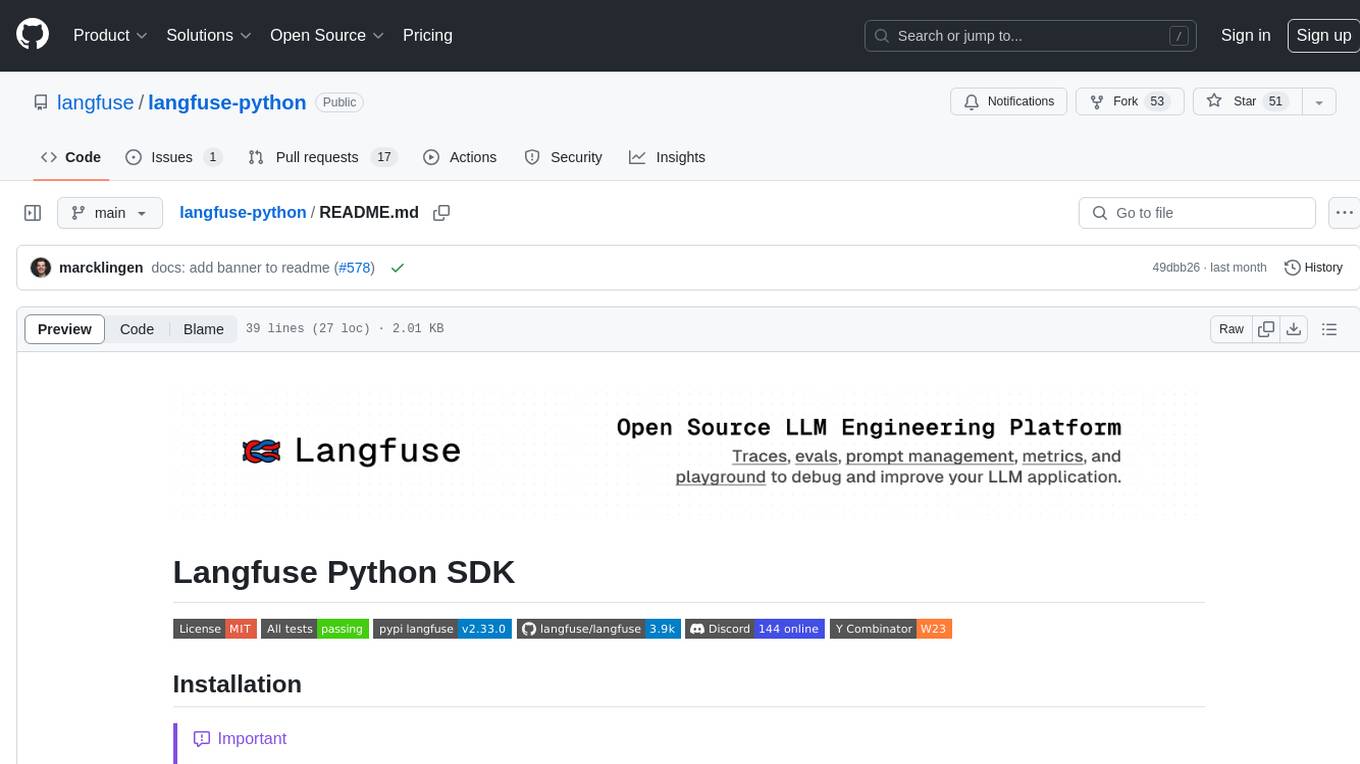
langfuse-python
Langfuse Python SDK is a software development kit that provides tools and functionalities for integrating with Langfuse's language processing services. It offers decorators for observing code behavior, low-level SDK for tracing, and wrappers for accessing Langfuse's public API. The SDK was recently rewritten in version 2, released on December 17, 2023, with detailed documentation available on the official website. It also supports integrations with OpenAI SDK, LlamaIndex, and LangChain for enhanced language processing capabilities.
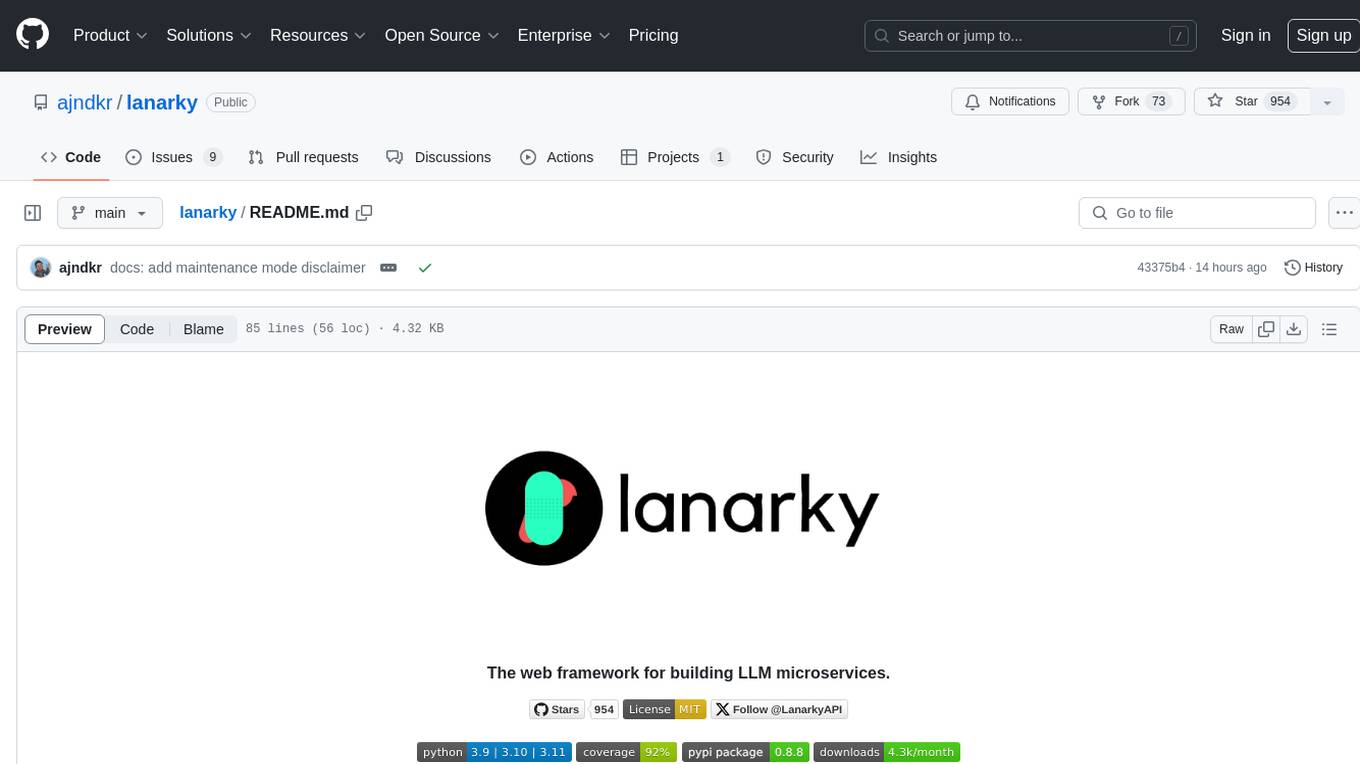
lanarky
Lanarky is a Python web framework designed for building microservices using Large Language Models (LLMs). It is LLM-first, fast, modern, supports streaming over HTTP and WebSockets, and is open-source. The framework provides an abstraction layer for developers to easily create LLM microservices. Lanarky guarantees zero vendor lock-in and is free to use. It is built on top of FastAPI and offers features familiar to FastAPI users. The project is now in maintenance mode, with no active development planned, but community contributions are encouraged.
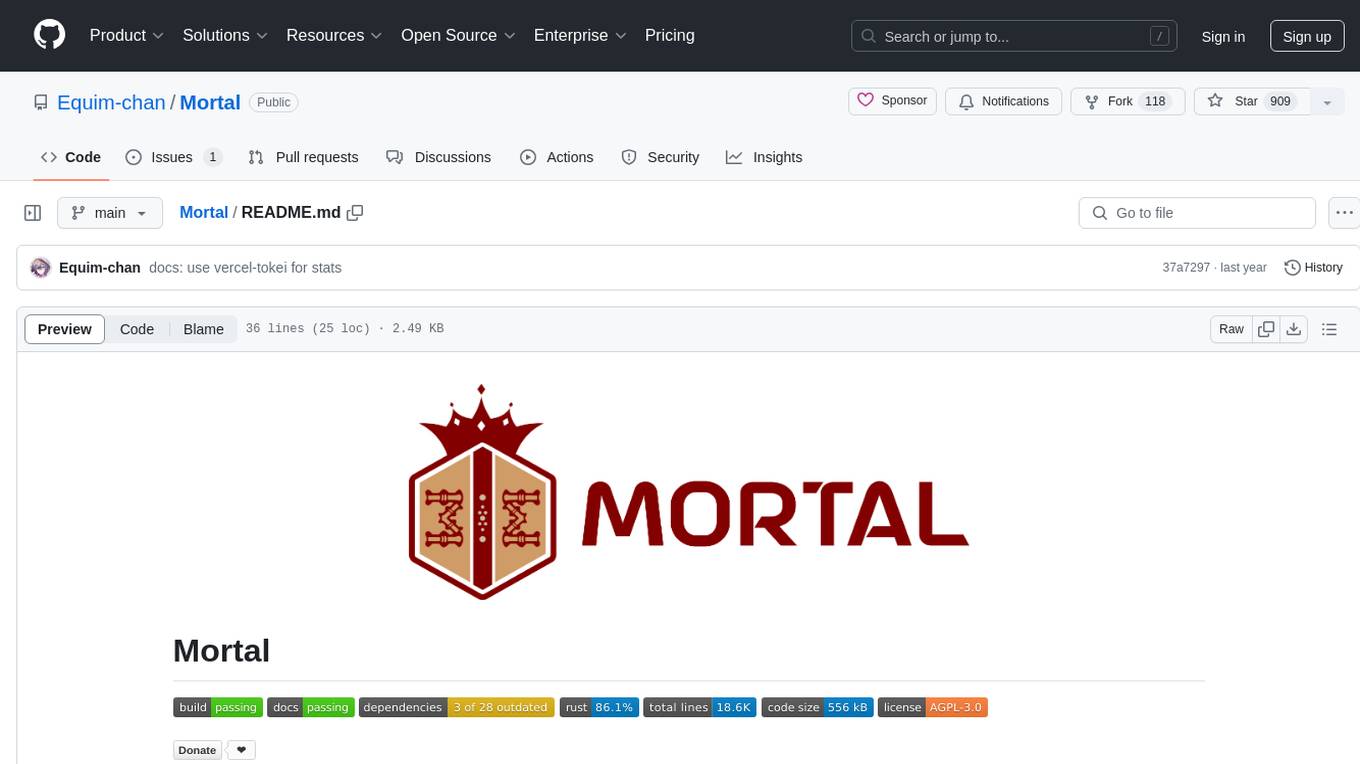
Mortal
Mortal (凡夫) is a free and open source AI for Japanese mahjong, powered by deep reinforcement learning. It provides a comprehensive solution for playing Japanese mahjong with AI assistance. The project focuses on utilizing deep reinforcement learning techniques to enhance gameplay and decision-making in Japanese mahjong. Mortal offers a user-friendly interface and detailed documentation to assist users in understanding and utilizing the AI effectively. The project is actively maintained and welcomes contributions from the community to further improve the AI's capabilities and performance.
For similar tasks
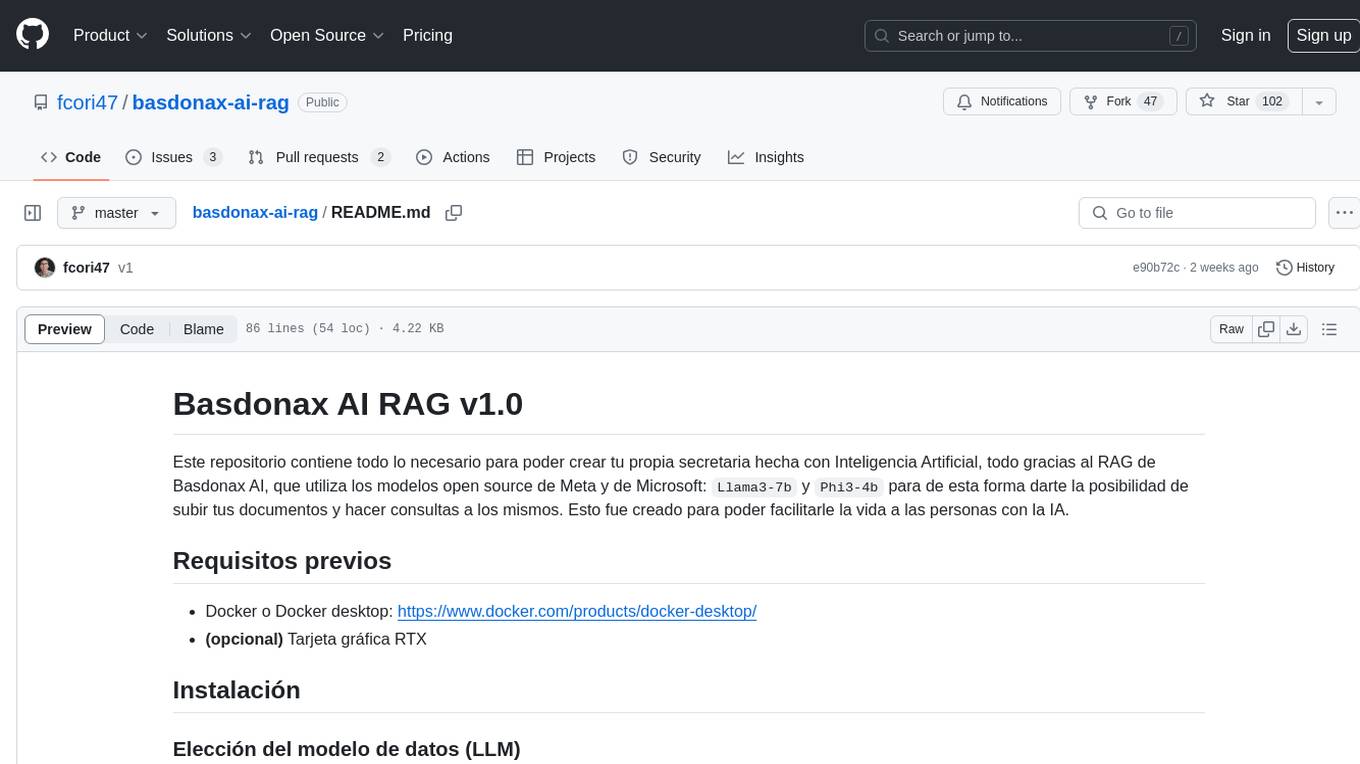
basdonax-ai-rag
Basdonax AI RAG v1.0 is a repository that contains all the necessary resources to create your own AI-powered secretary using the RAG from Basdonax AI. It leverages open-source models from Meta and Microsoft, namely 'Llama3-7b' and 'Phi3-4b', allowing users to upload documents and make queries. This tool aims to simplify life for individuals by harnessing the power of AI. The installation process involves choosing between different data models based on GPU capabilities, setting up Docker, pulling the desired model, and customizing the assistant prompt file. Once installed, users can access the RAG through a local link and enjoy its functionalities.
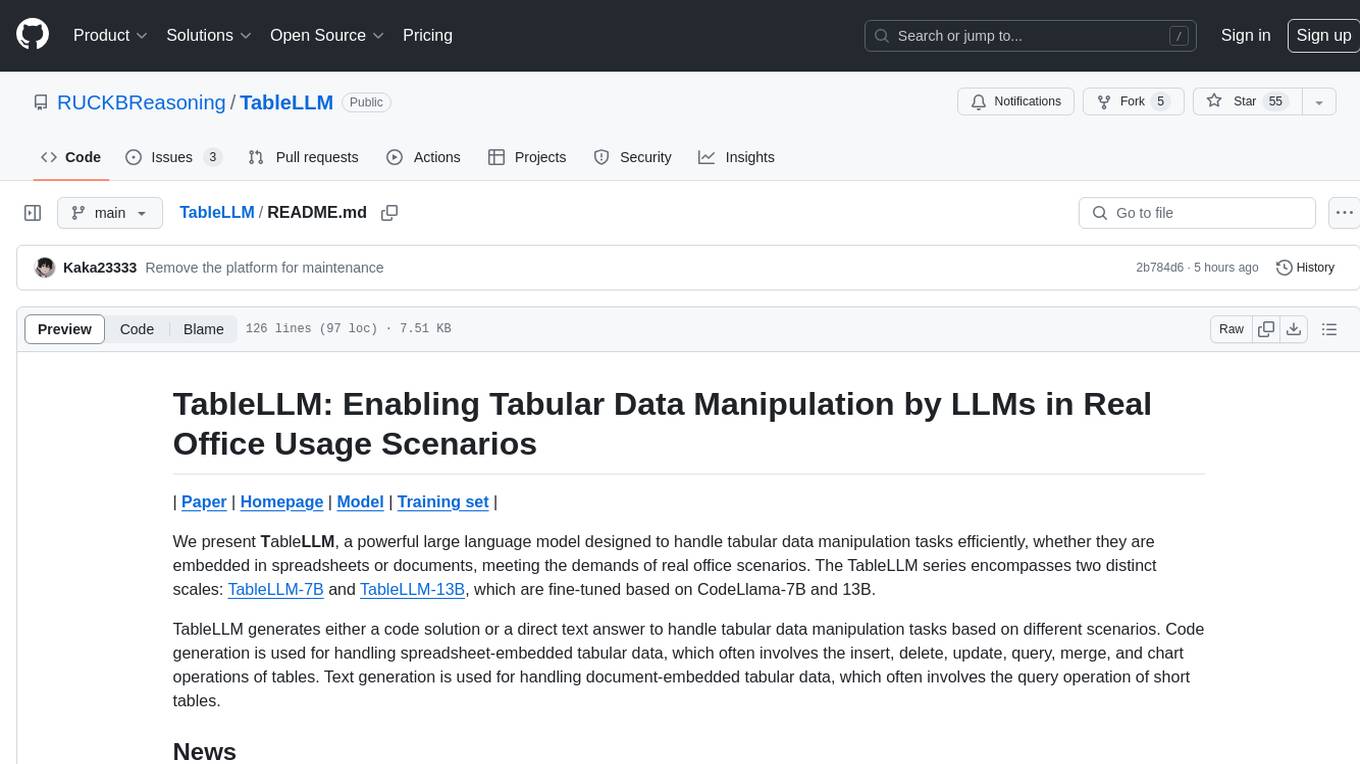
TableLLM
TableLLM is a large language model designed for efficient tabular data manipulation tasks in real office scenarios. It can generate code solutions or direct text answers for tasks like insert, delete, update, query, merge, and chart operations on tables embedded in spreadsheets or documents. The model has been fine-tuned based on CodeLlama-7B and 13B, offering two scales: TableLLM-7B and TableLLM-13B. Evaluation results show its performance on benchmarks like WikiSQL, Spider, and self-created table operation benchmark. Users can use TableLLM for code and text generation tasks on tabular data.

awesome-agents
Awesome Agents is a curated list of open source AI agents designed for various tasks such as private interactions with documents, chat implementations, autonomous research, human-behavior simulation, code generation, HR queries, domain-specific research, and more. The agents leverage Large Language Models (LLMs) and other generative AI technologies to provide solutions for complex tasks and projects. The repository includes a diverse range of agents for different use cases, from conversational chatbots to AI coding engines, and from autonomous HR assistants to vision task solvers.
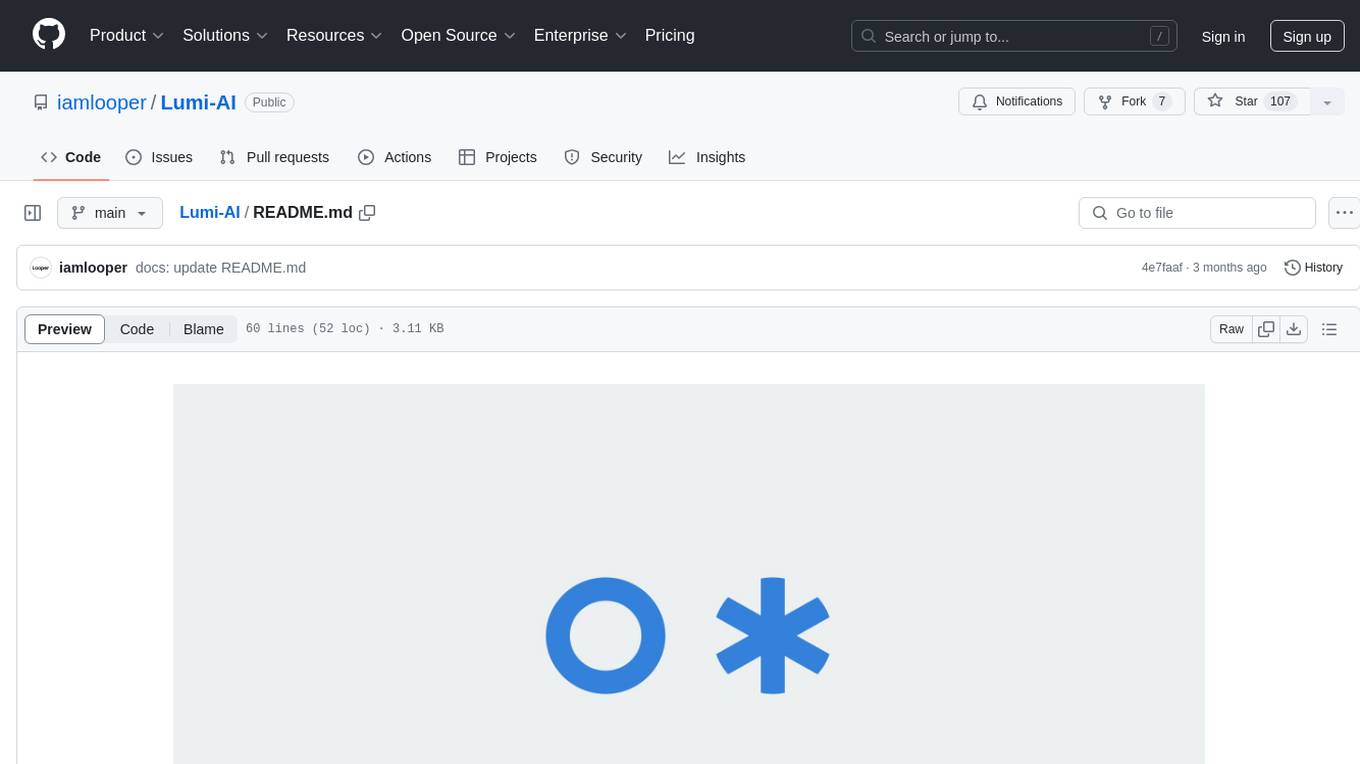
Lumi-AI
Lumi AI is a friendly AI sidekick with a human-like personality that offers features like file upload and analysis, web search, local chat storage, custom instructions, changeable conversational style, enhanced context retention, voice query input, and various tools. The project has been developed with contributions from a team of developers, designers, and testers, and is licensed under Apache 2.0 and MIT licenses.
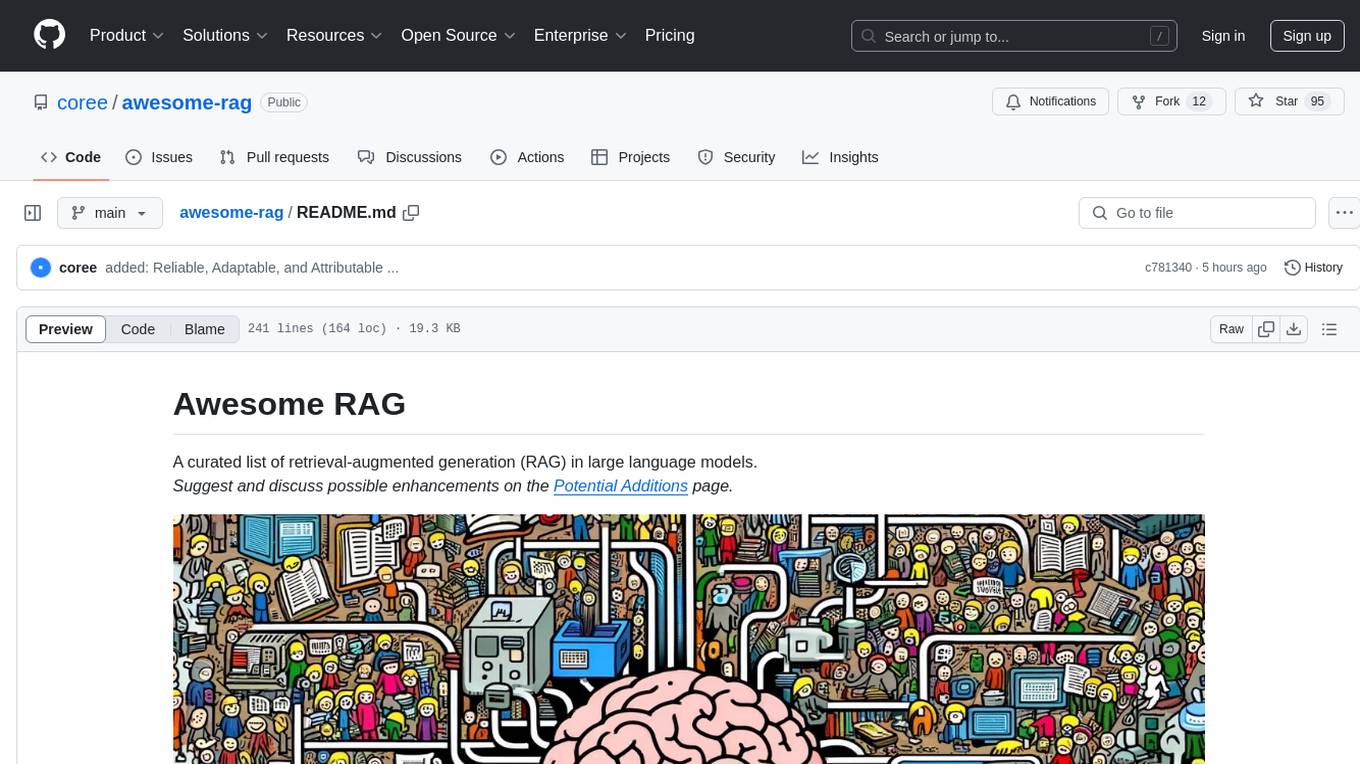
awesome-rag
Awesome RAG is a curated list of retrieval-augmented generation (RAG) in large language models. It includes papers, surveys, general resources, lectures, talks, tutorials, workshops, tools, and other collections related to retrieval-augmented generation. The repository aims to provide a comprehensive overview of the latest advancements, techniques, and applications in the field of RAG.
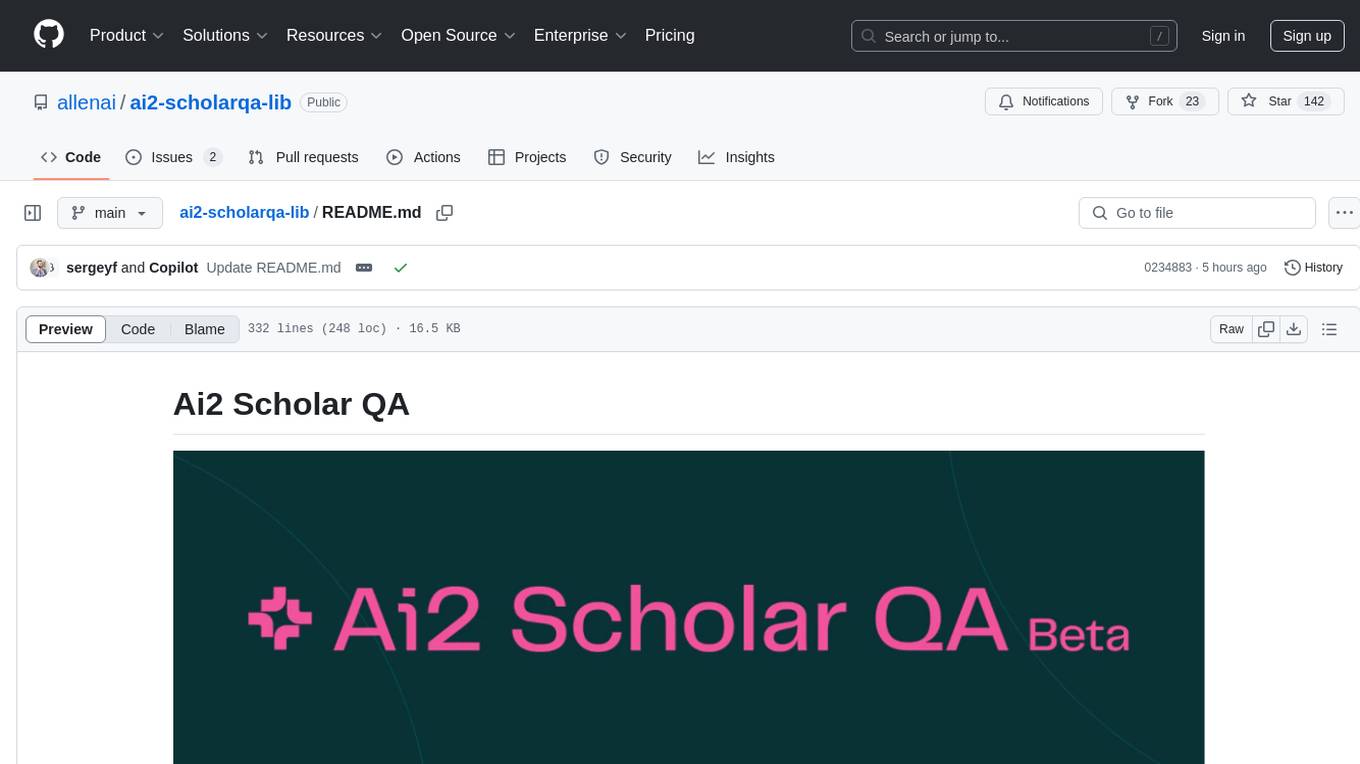
ai2-scholarqa-lib
Ai2 Scholar QA is a system for answering scientific queries and literature review by gathering evidence from multiple documents across a corpus and synthesizing an organized report with evidence for each claim. It consists of a retrieval component and a three-step generator pipeline. The retrieval component fetches relevant evidence passages using the Semantic Scholar public API and reranks them. The generator pipeline includes quote extraction, planning and clustering, and summary generation. The system is powered by the ScholarQA class, which includes components like PaperFinder and MultiStepQAPipeline. It requires environment variables for Semantic Scholar API and LLMs, and can be run as local docker containers or embedded into another application as a Python package.
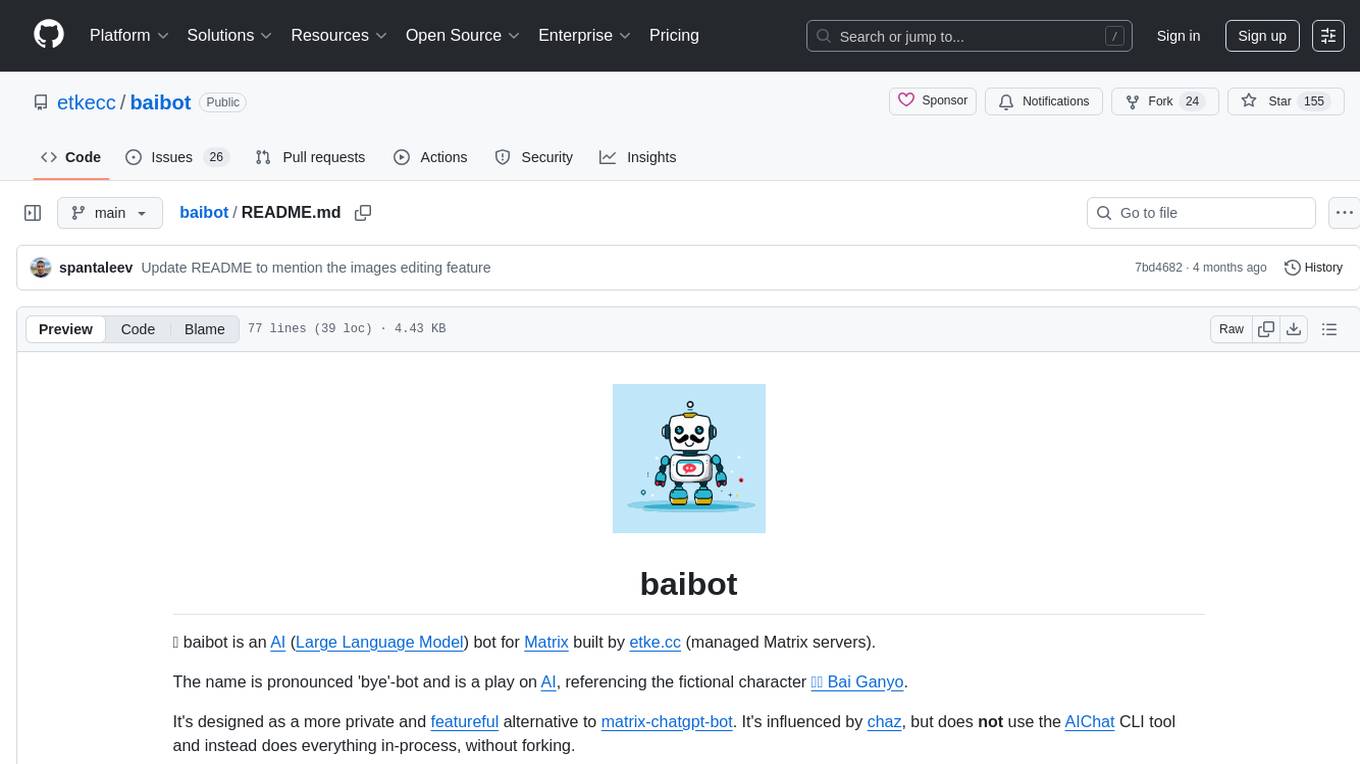
baibot
Baibot is a versatile chatbot framework designed to simplify the process of creating and deploying chatbots. It provides a user-friendly interface for building custom chatbots with various functionalities such as natural language processing, conversation flow management, and integration with external APIs. Baibot is highly customizable and can be easily extended to suit different use cases and industries. With Baibot, developers can quickly create intelligent chatbots that can interact with users in a seamless and engaging manner, enhancing user experience and automating customer support processes.
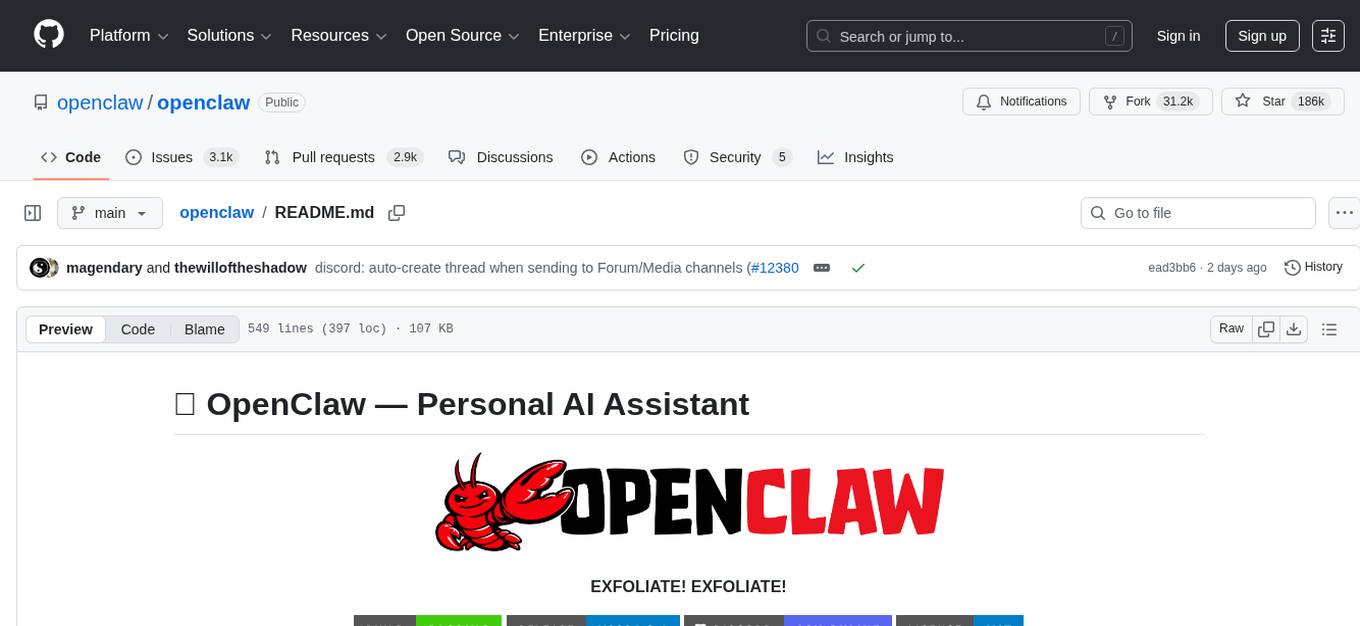
openclaw
OpenClaw is a personal AI assistant that runs on your own devices, answering you on various channels like WhatsApp, Telegram, Slack, Discord, and more. It can speak and listen on different platforms and render a live Canvas you control. The Gateway serves as the control plane, while the assistant is the main product. It provides a local, fast, and always-on single-user assistant experience. The preferred setup involves running the onboarding wizard in your terminal to guide you through setting up the gateway, workspace, channels, and skills. The tool supports various models and authentication methods, with a focus on security and privacy.
For similar jobs

weave
Weave is a toolkit for developing Generative AI applications, built by Weights & Biases. With Weave, you can log and debug language model inputs, outputs, and traces; build rigorous, apples-to-apples evaluations for language model use cases; and organize all the information generated across the LLM workflow, from experimentation to evaluations to production. Weave aims to bring rigor, best-practices, and composability to the inherently experimental process of developing Generative AI software, without introducing cognitive overhead.

LLMStack
LLMStack is a no-code platform for building generative AI agents, workflows, and chatbots. It allows users to connect their own data, internal tools, and GPT-powered models without any coding experience. LLMStack can be deployed to the cloud or on-premise and can be accessed via HTTP API or triggered from Slack or Discord.

VisionCraft
The VisionCraft API is a free API for using over 100 different AI models. From images to sound.

kaito
Kaito is an operator that automates the AI/ML inference model deployment in a Kubernetes cluster. It manages large model files using container images, avoids tuning deployment parameters to fit GPU hardware by providing preset configurations, auto-provisions GPU nodes based on model requirements, and hosts large model images in the public Microsoft Container Registry (MCR) if the license allows. Using Kaito, the workflow of onboarding large AI inference models in Kubernetes is largely simplified.

PyRIT
PyRIT is an open access automation framework designed to empower security professionals and ML engineers to red team foundation models and their applications. It automates AI Red Teaming tasks to allow operators to focus on more complicated and time-consuming tasks and can also identify security harms such as misuse (e.g., malware generation, jailbreaking), and privacy harms (e.g., identity theft). The goal is to allow researchers to have a baseline of how well their model and entire inference pipeline is doing against different harm categories and to be able to compare that baseline to future iterations of their model. This allows them to have empirical data on how well their model is doing today, and detect any degradation of performance based on future improvements.

tabby
Tabby is a self-hosted AI coding assistant, offering an open-source and on-premises alternative to GitHub Copilot. It boasts several key features: * Self-contained, with no need for a DBMS or cloud service. * OpenAPI interface, easy to integrate with existing infrastructure (e.g Cloud IDE). * Supports consumer-grade GPUs.

spear
SPEAR (Simulator for Photorealistic Embodied AI Research) is a powerful tool for training embodied agents. It features 300 unique virtual indoor environments with 2,566 unique rooms and 17,234 unique objects that can be manipulated individually. Each environment is designed by a professional artist and features detailed geometry, photorealistic materials, and a unique floor plan and object layout. SPEAR is implemented as Unreal Engine assets and provides an OpenAI Gym interface for interacting with the environments via Python.

Magick
Magick is a groundbreaking visual AIDE (Artificial Intelligence Development Environment) for no-code data pipelines and multimodal agents. Magick can connect to other services and comes with nodes and templates well-suited for intelligent agents, chatbots, complex reasoning systems and realistic characters.













































